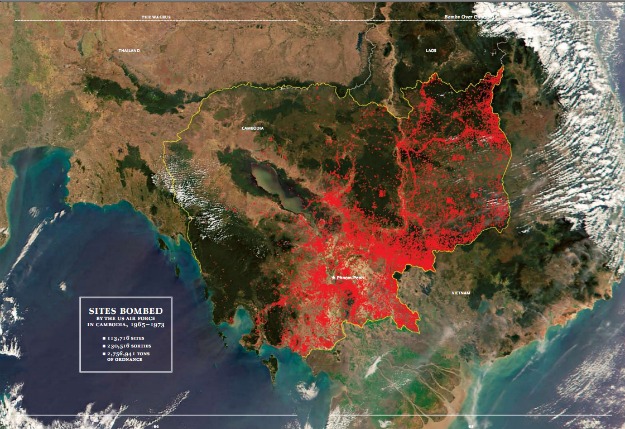
Vietnam War: Iconic picture of napalmed children.
By John Glaser,
March 22, 2012
Courtesy Of "Anti-War"
Something like 600,000 civilians were killed in America’s 11-year secret bombing campaign in Cambodia during the Vietnam War. From 1964 – 1975, the U.S. rained giant explosives from the sky, destroying the country and leading to the terrible Khmer Rouge, an authoritarian regime responsible for the deaths of well over a million people. Via Joshua Keating, Taylor Owen has been the primary researcher digging into the declassified files of the bombing campaign and has for years been expanding our picture of it. Here is a mapping of the terrorism:
The outrageous, senseless, criminal war in Indochina, directly responsible for the deaths of perhaps over 3 million people, is probably a good indicator of how the war in Afghanistan will be treated in the coming years and long after it is over. Frankly, the war in Indochina was far worse than what Washington has committed in Afghanistan by any metric. But after this latest sadistic massacre of 17 civilians by U.S. Staff Sgt. Robert Bales, it’s worth considering the parallels in the dialogue of what are obvious acts of murder and aggression by the U.S. in Afghanistan and Indochina.
First, there will be total legal and moral immunity granted to the people in Washington who have crafted and perpetuated the bloody war policies in Afghanistan. Like Henry Kissinger, who drew up plans for the terrorist bombing in Cambodia, these people will live long lives of fame and fortune and esteem without fear of being held accountable for killing innumerable innocents.
Second, we can expect the legacy of the war in Afghanistan to be that it was largely a mistake, despite the best intentions of Washington. The “mistake” part, though, will be framed in terms of the costs borne by America, not by our victims. Robert Bales will not be remembered, nor will the names of those he slaughtered in cold blood. The number of U.S. casualties will be known, but certainly not those of Afghans.
This rule generalizes throughout all of America’s wars. In the eyes of the public, U.S. foreign policy is inherently virtuous and benevolent, at least in its aims. That public officials can commit crimes against humanity and suffer no moral or legal consequences and that the public never views America’s wars from the point of view of our victims both ensure such policies will be repeated in the future.

U.S. soldier with Iraqi detainee, in Abu Ghraib Prison, Baghdad, Iraq.





No comments:
Post a Comment